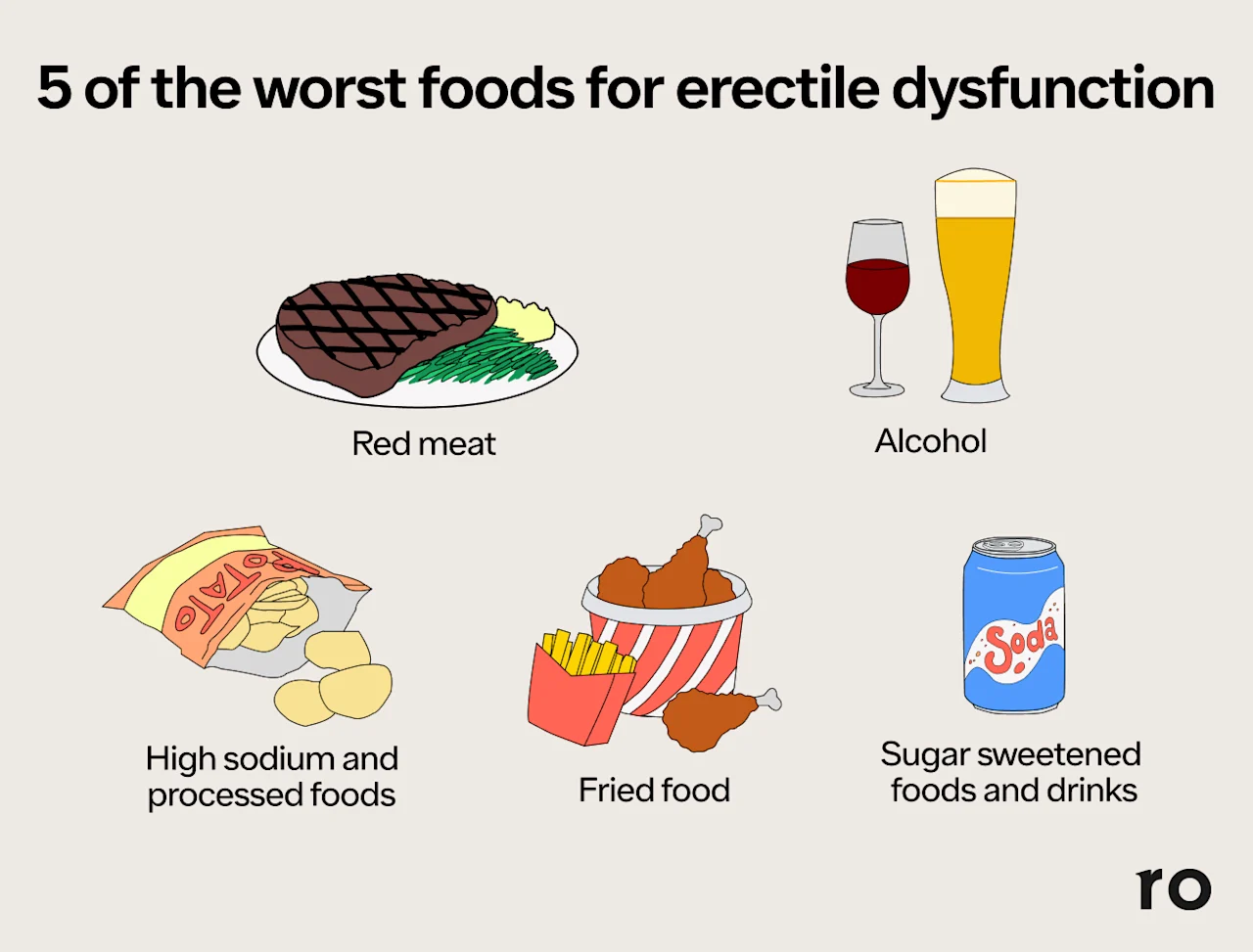Here's what we'll cover
Here's what we'll cover
Here's what we'll cover
It’s normal to have occasional erection problems, and it can happen to men of all ages. But if you suspect erectile dysfunction (ED) is to blame, you might wonder how to manage it. Erectile dysfunction pills are a solid place to start, but lifestyle habits—such as avoiding the worst foods for erectile dysfunction—are worth considering too.
Now, dietary changes won’t have the same effect as ED medications like Viagra. But when it comes to managing sexual health, limiting certain foods might reduce factors linked to erection issues. Here, learn about the possible foods that cause erectile dysfunction, plus how they affect the body.
Can foods cause erectile dysfunction?
Before exploring the link between food and erectile dysfunction, it’s important we all know the basics of the condition. So, let’s get to it: Erectile dysfunction (ED) is the inability to get or keep an erection long enough for satisfying sex. While it tends to become more common with age, ED can happen for a range of reasons, including mental health issues, chronic conditions, certain medications, and lifestyle factors, such as—yup— diet.
Of course, there’s no one food that specifically causes ED. But what you eat (and drink) certainly can influence sexual function and wellness, including how well you can get and stay erect.
An erection is the magical result of teamwork among different systems in the body. When aroused, your brain sends signals to the penis, which trigger chemicals that relax erectile tissues. This allows blood to rush into the penis, where it gets trapped and, in turn, you get hard. Clearly, blood flow plays a pretty key role in the whole process. So, it makes sense that issues with blood flow—such as in the case of cardiovascular disease—can commonly cause ED. And guess what’s associated with seemingly every type of heart issue? Poor diet.
Additionally, certain foods have been found to increase chronic inflammation, a process that can contribute to ED. It’s thought that inflammation increases vascular endothelial injury, or blood vessel damage, paving the way for blood flow issues. Chronic inflammation is also associated with diabetes and heart disease, two risk factors for erectile dysfunction.
5 of the worst foods for erectile dysfunction
Red meat
Red meat, including pork and beef, might be one of the worst foods for erectile dysfunction. The reason? Red meat is high in saturated fat, which can increase total blood cholesterol. This excess cholesterol can build up in the arteries, leading to atherosclerosis (i.e. the clogging of arteries), poor blood flow, and eventually, heart disease—a major risk factor for ED. Additionally, the buildup of cholesterol in the arteries also triggers inflammation, another potential killer of healthy erections.
Alcohol
Okay, okay, so it’s not technically a food. But what you drink is just as much of a key part of your diet as what you eat. So, beverages (such as alcohol) can also have an impact on your sexual function.
If you enjoy the occasional beer or glass of wine, you’ll be glad to know that it likely won’t cause or worsen ED. In fact, thanks to its anxiety-reducing effects, mild alcohol intake might actually be able to help you get hard. (Keyword being “mild.”)
Drinking too much, however, has the opposite effect. Heavy drinking can cause inflammation, which can increase the risk of heart disease, diabetes, and other factors related to ED. It can also harm the liver, which can eventually trigger a boost in estrogen (the female sex hormone) and decreased testosterone (the male sex hormone). This can contribute to ED, as testosterone does a lot to facilitate the natural process of obtaining an erection, from having an impact on the brain to the penis itself. High sodium and processed foods.
High sodium and processed foods
Processed foods can be particularly high in sodium. This mineral is needed for overall health, but a high intake has been linked to inflammation, atherosclerosis, high blood pressure, and heart disease, further increasing the risk of erection problems. More specifically, high blood pressure can damage the walls of blood vessels over time. Atherosclerosis can also block blood vessels and negatively impact blood flow, so both of these conditions have negative effects on erections. Examples of processed foods include cold cuts (particularly red meat), frozen foods, and packaged snacks like potato chips. As these items tend to be high in sodium, they can be considered some of the worst foods for ED. Consider avoiding or limiting them if sexual health is at the top of mind.
Fried foods
If you eat a generally balanced diet, enjoying the occasional fried food—think: mozzarella sticks, chicken fingers, and French fries—is typically harmless. But eating too much fried food can negatively affect your ability to achieve and keep erections. Frying food in oil adds unhealthy fats, specifically saturated and trans fats. When eaten in excess, these fats can increase the risk of heart disease and atherosclerosis, potentially disrupting blood flow and negatively impacting sexual function.
Sugar-sweetened foods and drinks
Sugary snacks and beverages might satisfy your taste buds, but overdoing them might lead to issues with getting and staying hard. Excess sugar can increase inflammation, potentially contributing to obesity, heart disease, and diabetes). This is bad news for sexual health, as all three conditions are associated with ED. Overdoing the sugar can also increase the risk of hypogonadism, which happens when the sex glands (gonads) produce little-to-no testosterone. Again, the hormone plays an important role in erectile function.

Other causes of erectile dysfunction
ED is often multifactorial, meaning there are many reasons behind the condition. In addition to a diet high in the above worst foods for erectile dysfunction, other possible causes include:
Age. Aging increases the risk of chronic conditions associated with ED. Plus, over time, testosterone levels naturally decline, which can have an effect on erectile function in some people..
Medication. Certain prescription drugs can lead to issues with sexual function. Examples include antidepressants, antihistamines, and high blood pressure medications.
Mental health conditions. Anxiety, major depressive disorder, and stress are associated with ED. These conditions can have an impact on overall libido as well. Depression can also reduce activity of the parasympathetic nervous system, a system that is typically responsible for erectile function.
Cigarette smoking. Smoking cigarettes can contribute to many ED risk factors, including inflammation and heart disease. Cigarette smoke also exposes the body to free radicals, or harmful molecules that can damage blood vessels in the penis, potentially disrupting the blood flow needed for erections.
Chronic conditions. Even without the factor of diet, ED has been linked with several chronic conditions, including type 2 diabetes, kidney disease, and heart disease.
Lack of physical activity. A sedentary lifestyle can increase the risk of type 2 diabetes, heart disease, and obesity—all of which are risk factors for ED. For example, research has found that compared to men who spend less than an hour doing sedentary activities like being at a computer (or watching TV), those who spend five or more hours each day doing the same activities have triple the risk of developing ED.
Hormonal conditions. Hypogonadism, which causes low testosterone, is associated with ED. The same goes for hypothyroidism, or underactive thyroid, a condition marked by low thyroid hormones. Without enough thyroid hormones, the Leydig cells (which produce testosterone) are less stimulated to differentiate into mature cells, which can lead to less testosterone and erectile problems.
Best foods for erectile dysfunction
While you don’t have to completely give up the aforementioned foods, it’s worth focusing on foods that help you stay erect. In general, this includes foods that lower inflammation and the chances of developing ED-related chronic diseases.
According to a 2020 study, the Mediterranean diet is especially beneficial for maintaining sexual function. This style of eating includes the following, all of which—unsurprisingly given the aforementioned research—are good foods for ED.
Fruits
Vegetables
Nuts
Seeds
Legumes
Fish
Poultry
Olive oil
How to improve erectile dysfunction
In addition to eating a healthy diet that focuses on certain foods and limits others, there are other ways to treat or address erectile dysfunction. These include:
Exercise regularly. A growing body of evidence suggests exercise can improve erectile function. More specifically, Regular physical activity can improve cardiovascular health, which plays a key role in your ability to to achieve and maintain erections.
Get better sleep. Research suggests that poor sleep can contribute to ED. Aiming for at least 6 hours (ideally, 7-9) of shut-eye per night can promote better sexual and overall health.
Take care of your mental health. Sexual performance is just as much about the physical as it is about the mental. Practicing stress management and reduction techniques as well as getting assistance from an expert (if/as necessary) can help address ED.
Quit or limit smoking. Scaling back in the smoking department can be beneficial for your cardiovascular health, which plays a key role in your ability to get and maintain an erection.
Try prescription medication. While Viagra (sildenafil) and Cialis (tadalafil) might be the most well-known of the bunch, there are a handful of safe and effective ED drugs out there that are worth discussing with your healthcare provider. Not a fan of popping pills? You can still reap the rewards of these tried-and-true meds through different formulations, such as Ro Sparks—a dissolvable lozenge containing sildenafil and tadalafil (the active ingredients in Viagra and Cialis)—and Ro’s Daily Rise Gummies—fruit-flavored gummies, each of which contains 7 mg of tadalafil.
Bottom line
As diet isn’t the only factor that affects ED, avoiding a single food won’t completely prevent or resolve the condition. But paring back on the worst foods for erectile dysfunction can support your overall sexual health, especially when incorporated as part of an overall healthy lifestyle.
If you’re concerned about your sexual function, it’s always a good idea to talk to a healthcare provider, who can rule out any major causes and help you get on the right treatment plan.
DISCLAIMER
If you have any medical questions or concerns, please talk to your healthcare provider. The articles on Health Guide are underpinned by peer-reviewed research and information drawn from medical societies and governmental agencies. However, they are not a substitute for professional medical advice, diagnosis, or treatment.
Viagra Important Safety Information: Read more about serious warnings and safety info.
Cialis Important Safety Information: Read more about serious warnings and safety info.
References
Cho, J. W. & Duffy, J. F. (2019). Sleep, Sleep Disorders, and Sexual Dysfunction. The World Journal of Men's Health, 37(3), 261–275. https://doi.org/10.5534/wjmh.180045. Retrieved from https://www.ncbi.nlm.nih.gov/pmc/articles/PMC6704301/
Dilixiati, D., Waili, A., Tuerxunmaimaiti, A., et al. (2024). Risk factors for erectile dysfunction in diabetes mellitus: a systematic review and meta-analysis. Frontiers in Endocrinology, 15, 1368079. https://doi.org/10.3389/fendo.2024.1368079. Retrieved from https://www.frontiersin.org/journals/endocrinology/articles/10.3389/fendo.2024.1368079/full
Emanuele, M. A. & Emanuele, N. V. (1998). Alcohol's effects on male reproduction. Alcohol Health and Research World, 22(3), 195–201. Retrieved from https://www.ncbi.nlm.nih.gov/pmc/articles/PMC6761906/
Hernández-Cerda, J., Bertomeu-González, V., Zuazola, P., & Cordero, A. (2020). Understanding erectile dysfunction in hypertensive patients: the need for good patient management. Vascular Health and Risk Management, 16 , 231–239. doi:10.2147/VHRM.S223331. Retrieved from https://www.ncbi.nlm.nih.gov/pmc/articles/PMC7297457/Koh, K., Kim, S. S.,
Kim, J. S., et al. (2022). Relationship between Alcohol Consumption and Testosterone Deficiency according to Facial Flushes among Middle-Aged and Older Korean Men. Korean Journal of Family Medicine, 43(6), 381–387. https://doi.org/10.4082/kjfm.21.0173. Retrieved from https://www.kjfm.or.kr/journal/view.php?doi=10.4082/kjfm.21.0173
Lajous, M., Bijon, A., Fagherazzi, G., et al. (2014). Processed and unprocessed red meat consumption and hypertension in women. The American Journal of Clinical Nutrition, 100(3), 948–952. https://doi.org/10.3945/ajcn.113.080598. Retrieved from https://www.sciencedirect.com/science/article/pii/S0002916523047627?via%3Dihub
Leslie, S. W. & Sooriyamoorthy, T. (2024). Erectile dysfunction. StatPearls. Retrieved on Jun. 24, 2024 from https://www.ncbi.nlm.nih.gov/books/NBK562253/
Lin, W. T., Kao, Y. H., Li, M. S., et al. (2022). Sugar-sweetened beverages intake, abdominal obesity, and inflammation among US Adults without and with prediabetes-An NHANES Study. International Journal of Environmental Research and Public Health, 20(1), 681. https://doi.org/10.3390/ijerph20010681. Retrieved from https://www.mdpi.com/1660-4601/20/1/681
Monguchi, T., Hara, T., Hasokawa, M., et al. (2017). Excessive intake of trans fatty acid accelerates atherosclerosis through promoting inflammation and oxidative stress in a mouse model of hyperlipidemia. Journal of Cardiology, 70(2), 121–127. https://doi.org/10.1016/j.jjcc.2016.12.012. Retrieved from https://www.sciencedirect.com/science/article/pii/S0914508717300151
Ruan Z., Xie X., Yu H., et al. (2022). Association between dietary inflammation and erectile dysfunction among US adults: A cross-sectional analysis of the National Health and Nutrition Examination Survey 2001–2004. Frontiers in Nutrition, 9, 930272. https://doi.org/10.3389/fnut.2022.930272. Retrieved from https://www.frontiersin.org/journals/nutrition/articles/10.3389/fnut.2022.930272/full
Shen, L., Ju-Min, S., Ke, Z., et al. (2021). A meta-analysis of erectile dysfunction and alcohol consumption. Urologia Internationalis, 105(11-12), 969-985. https://doi.org/10.1159/000508171. Retrieved from https://karger.com/uin/article/105/11-12/969/829299/A-Meta-Analysis-of-Erectile-Dysfunction-and
Silva, A. B., Sousa, N., Azevedo, L. F., & Martins, C. (2017). Physical activity and exercise for erectile dysfunction: systematic review and meta-analysis. British Journal of Sports Medicine, 51(19), 1419–1424. https://doi.org/10.1136/bjsports-2016-096418. Retrieved from https://pubmed.ncbi.nlm.nih.gov/27707739/
Sun, L., Yuan, J. L., Chen, Q. C., et al. (2022). Red meat consumption and risk for dyslipidaemia and inflammation: A systematic review and meta-analysis. Frontiers in Cardiovascular Medicine, 9, 996467. https://doi.org/10.3389/fcvm.2022.996467. Retrieved from https://www.frontiersin.org/journals/cardiovascular-medicine/articles/10.3389/fcvm.2022.996467/full
Wang, X. M., Bai, Y. J., Yang, Y. B., et al. (2018). Alcohol intake and risk of erectile dysfunction: a dose-response meta-analysis of observational studies. International Journal of Impotence Research, 30(6), 342–351. https://doi.org/10.1038/s41443-018-0022-x. Retrieved from https://pubmed.ncbi.nlm.nih.gov/30232467/
Yafi, F. A., Jenkins, L., Albersen, M., et al. (2016). Erectile dysfunction. Nature Reviews. Disease Primers, 2, 16003. https://doi.org/10.1038/nrdp.2016.3. Retrieved from https://www.nature.com/articles/nrdp20163












